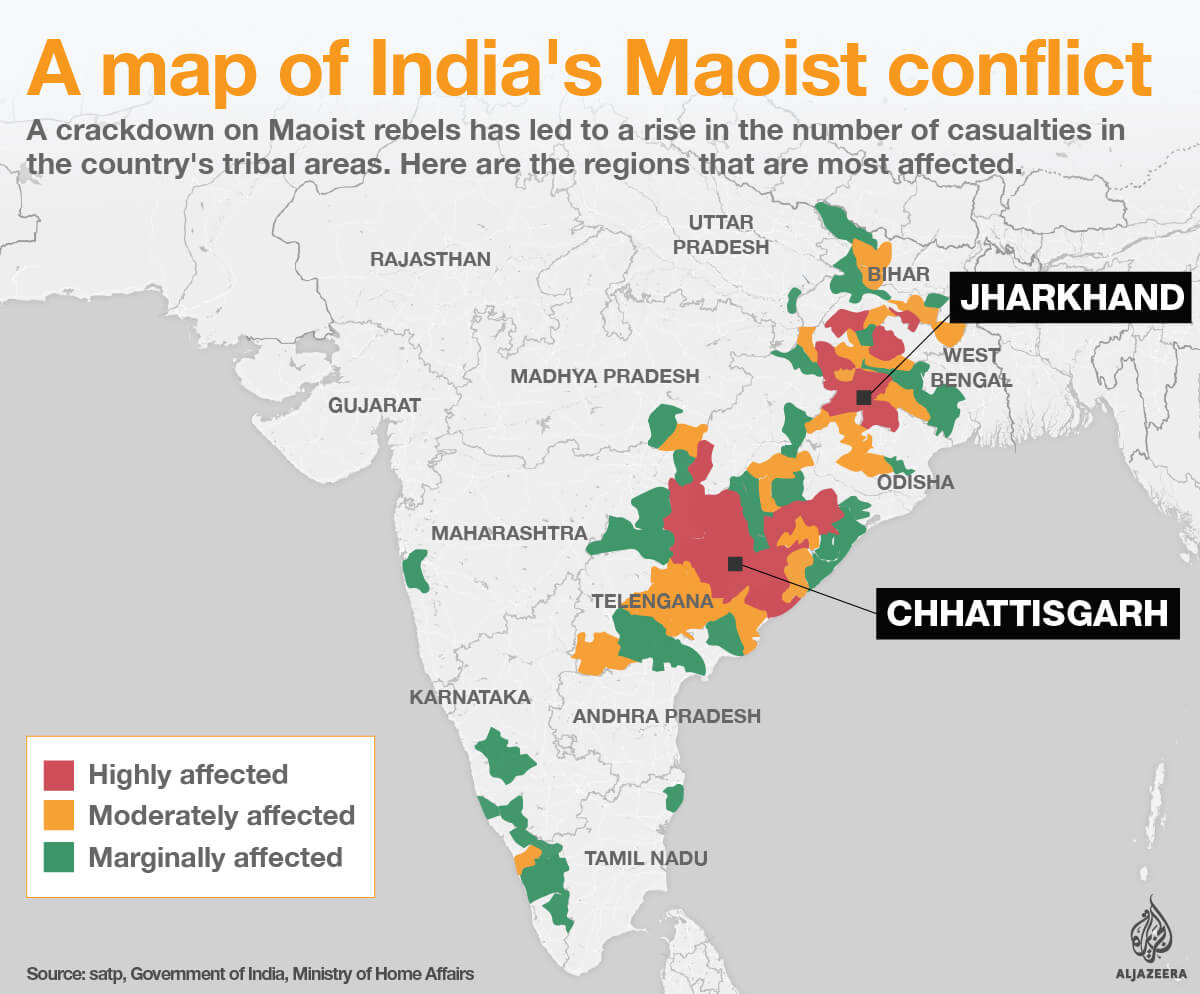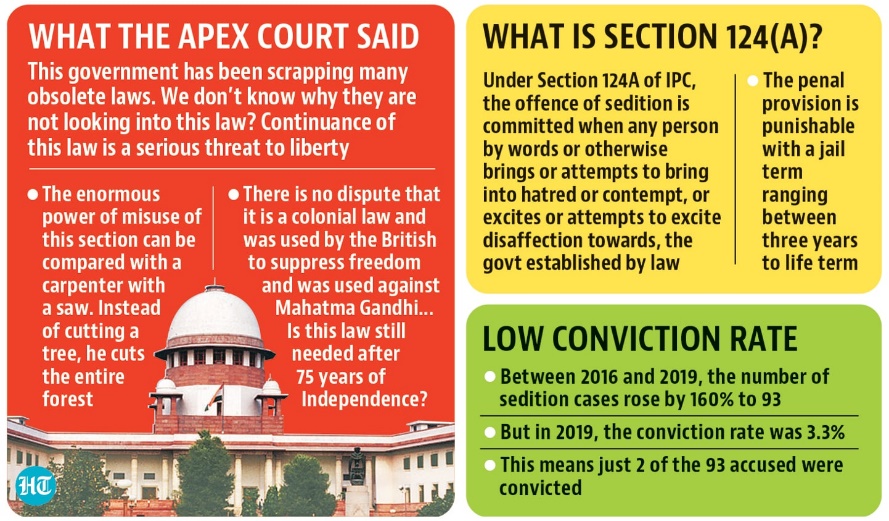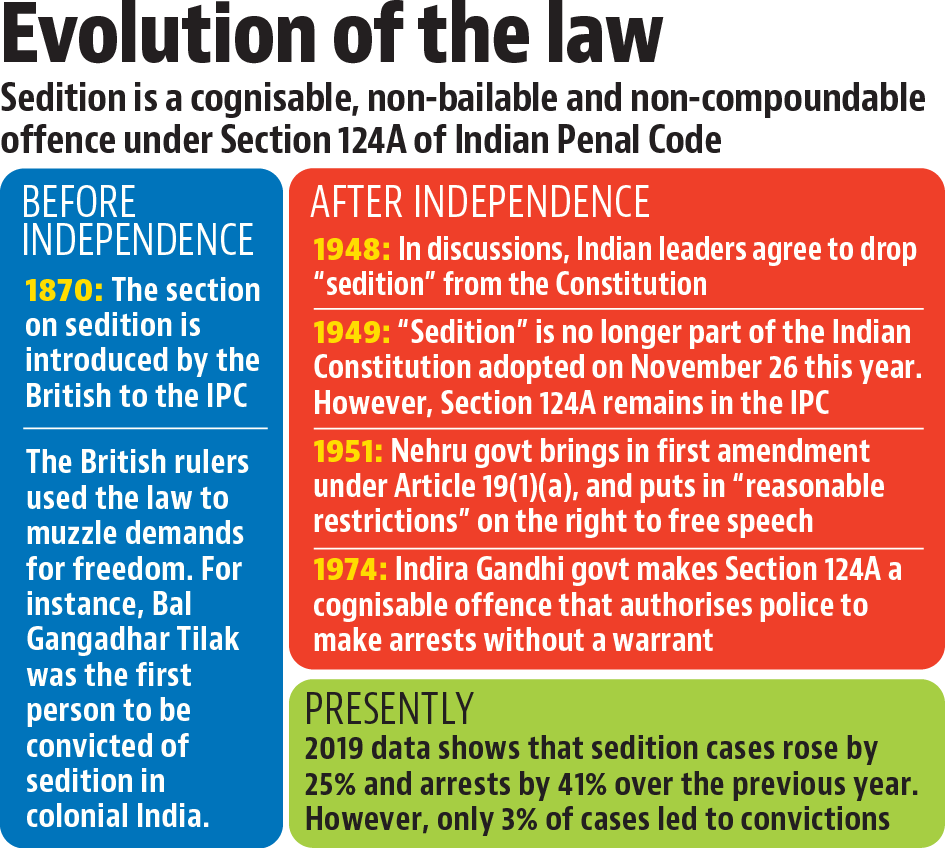- Home
- Prelims
- Mains
- Current Affairs
- Study Materials
- Test Series
 EDITORIALS & ARTICLES
EDITORIALS & ARTICLES
Rethink the retention of sedition
- According to the National Crime Records Bureau (NCRB), the number of cases registered only under Section 124A IPC was zero in the years 2015, 2016, 2017, and 2020.
- This has ranged from one to a maximum three between the years 2014 and 2021.
- According to a government data, 326 sedition cases were registered across the country between 2014 and 2019 and only six persons were convicted of these.
- According to a government data, under the title ''offences against the State'' there were a total of 179 arrests made for sedition.
- However, no charge sheets were filed by the police in over 70% of the cases, and only two convictions were given during this time period.
Law Commission on Section 124A of the Indian Penal Code
- The Law Commission of India in its 279th report has recommended the retention of Section 124A of the Indian Penal Code (IPC) on ‘sedition’.
- According to the Law Commission the retention of section was necessary as it was useful in countering the threat to India’s internal security.
- The Law Commission has stated that the Unlawful Activities (Prevention) Act (UAPA), 1967, does not cover all elements of the offence as envisaged under Section 124A IPC.
- The Law Commission has recommended certain procedural guidelines to prevent the misuse of Section 124A IPC.
Supreme Court on Section 124A of the Indian Penal Code
- In “S.G. Vombatkere v. Union of India case” the Supreme Court of India had directed all State and the Central government to keep in suspend all pending trials, appeals, and proceedings with regard to Section 124A IPC.
- The Supreme Court was of view that this Section was not in tune with the current social culture.
Maoist and necessity of Section 124A of the Indian Penal Code
- According to the data from the Ministry of Home Affairs, the number of Maoist incidents ranges from 1,533 in 2004 to 509 in 2021.
- The fatality has varied from 566 to 147 during the same period.
- The central agenda of the Maoists is to capture political power by overthrowing the democratically elected government through a protracted armed struggle.
- This is the reason government need to tackle them stringently.
- Despite decrease in the overall Maoist violence in the recent years, Chhattisgarh still reports the maximum number of Maoist incidents.
- The use of Section 124A IPC in fighting Maoism has been negligible.
- The use of Section 124A IPC in fighting Maoism has been negligible.
- The cases registered under the Unlawful Activities (Prevention) Act (UAPA), 1967 were close to three per year between the years 2014 and 2021.
- As the use of Improvised Explosive Devices (IED) and resorting to ambush attacks has remained the most used weapons by the Maoists, the most used provisions are sections under the Explosive Substances Act and the IPC.
- In some cases, the State law such as the Chhattisgarh Vishesh Jan Suraksha Adhiniyam (Chhattisgarh Special Public Safety Act), 2005, is applied to curb unlawful activities by the Maoists.

UAPA and Section 124A of IPC
- The ‘unlawful activity’ defined under Section 2(1)(o) of the UAPA includes ‘any action taken by such individual or association which causes or is intended to cause disaffection against India’.
- The punishment prescribed is imprisonment for up to seven years and a fine.
- The difference between Section 124A IPC and this provision of the UAPA is that in place of the words ‘Government established by law in India’, the word ‘India’ is used in the UAPA.
- The Supreme Court has stated that ‘criticising government’ does not fall within the ambit of sedition.
- The ‘unlawful activity’ as defined in the UAPA are more frequently used.
- Any hurdle before any such prosecution under the UAPA that requires Central government’s sanction can be removed by using Section 45 of the UAPA that authorises State governments to act and grant sanction for prosecution.


Placing Sedition under Preliminary inquiry
- The procedural guidelines for conducting a preliminary inquiry to check whether some cogent evidence are in conflict with the established jurisprudence of writing the First Information Report (FIR), was settled by Supreme Court in Lalita Kumari v. Govt. of Uttar Pradesh and others (2014).
- So, if information given to a police station discloses the commission of a cognisable offence, the officer-in-charge has to register an FIR to commence investigation.
- A preliminary inquiry is permissible only in cases such as commercial, matrimonial, related to medical negligence or corruption and that do not disclose the basis of a cognisable offence.
- Even if it is assumed that a case of sedition could fall under such a category, the purpose of such an inquiry cannot be to ensure whether cogent evidence exists to support the allegations.
- If such a provision is inserted by an amendment to the Code of Criminal Procedure (CrPC), there is likelihood of such an amendment being in conflict with the Article 14 of the Constitution and declared arbitrary by the Supreme Court.
- Article 14 states that “The State shall not deny to any person equality before the law or the equal protection of the laws within the territory of India.”
- Similar could be the result of the provision that mandatorily seek permission from the Central or the State government before registering an FIR.
It would be more democratic if all State and Central governments deliberate on the Law Commission’s report and public sought opinion to arrive at a more participative and agreeable decision. The United Kingdom has abolished the law on sedition by an Act of 2009, thus India should also rethink the existence of a colonial law in an independent India.









 Latest News
Latest News General Studies
General Studies